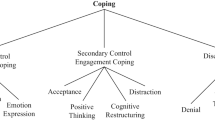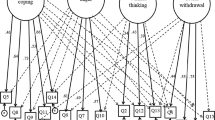Abstract
When experiencing natural disasters, coping is important. Individuals who have behavior problems may use less effective coping, however. This study sought to better understand the relationship between emerging adults’ behavior problems and coping following hurricanes. Using a sample of 193 emerging adults, correlations suggested that emerging adults who reported more behavior problems also endorsed higher levels of avoidant coping. More specifically, multivariate analyses of variance and subsequent post hoc analyses indicated that emerging adults who were experiencing relatively low levels of both internalizing and externalizing behavior problems endorsed avoidant coping significantly less often relative to those emerging adults who were experiencing relatively high levels of internalizing behavior problems only and those who were experiencing relatively high levels of both types of behavior problems. These results suggested that those who experience behavior problems following hurricanes may benefit from interventions that could improve the coping that they utilize.
Similar content being viewed by others
References
Achenbach, T. M., & Rescorla, L. A. (2003). Manual for the ASEBA adult forms and profiles. Burlington, VT: University of Vermont, Research Center for Children, Youth, & Families.
Amirkhan, J. H. (1998). Attributions as predictors of coping and distress. Personality and Social Psychological Bulletin, 24, 1006–1018.
Arnett, J. J. (1997). Young people’s conceptions of the transition to adulthood. Journal of Adult Development, 1, 154–168.
Arnett, J. J. (1998). Learning to stand alone: The contemporary American transition to adulthood in cultural and historical context. Human Development, 41, 295–315.
Arnett, J. J. (2000). Emerging adulthood: A theory of development from the late teens through the twenties. American Psychologist, 55, 469–480.
Arnett, J. J. (2007). Suffer, selfish, slackers? Myths and reality about emerging adults. Journal of Youth and Adolescence, 36, 23–29.
Beck, R., Taylor, C., & Robbins, M. (2003). Missing home: Sociotropy and autonomy and their relationship to psychological distress and homesickness in college freshmen. Anxiety, Stress, and Coping: An International Journal, 16, 155–166.
Benight, C. C., Swift, E., Sanger, J., Smith, A., & Zeppelin, D. (1999). Coping self-efficacy as a mediator of distress following a natural disaster. Journal of Applied Social Psychology, 29, 2443–2464.
Blimling, G. S., & Miltenberger, L. J. (1981). The resident assistant: Working with college students in residence halls (2nd ed.). Dubuque, IA: Kendall/Hunt.
Brougham, R. R., Zail, C. M., Mendoza, C. M., & Miller, J. R. (2009). Stress, sex differences, and coping strategies among college students. Current Psychology: A Journal for Diverse Perspectives on Diverse Psychological Issues, 28, 85–97.
Carver, C. S., Scheier, M. F., & Weintraub, J. K. (1989). Assessing coping strategies: A theoretically based approach. Journal of Personality and Social Psychology, 56, 267–283.
Chao, R. C. (2011). Managing stress and maintaining well-being: Social support, problem-focused coping, and avoidant coping. Journal of Counseling and Development, 89, 338–348.
Compas, B. E., Malcarne, V. L., & Fondacaro, K. M. (1988). Coping with stressful events in older children and adolescents. Journal of Consulting and Clinical Psychology, 56, 405–411.
Dyson, R., & Renk, K. (2006). Freshmen adaptation to university life: Depressive symptoms, stress, and coping. Journal of Clinical Psychology, 62, 1231–1244.
Eisenbarth, C. (2012). Coping profiles and psychological distress: A cluster analysis. North American Journal of Psychology, 14, 485–496.
Folkman, S., & Lazarus, R. S. (1980). An analysis of coping in a middle-aged community sample. Journal of Health and Social Behavior, 21, 219–239.
Goldscheider, F. K., & Davanzo, J. (1986). Semiautonomy and leaving home in early adulthood. Social Forces, 65, 187–201.
Goldscheider, F. K., & Goldscheider, C. (1993). Whose nest? A two-generational view of leaving home during the 1980s. Journal of Marriage and the Family, 55, 851–862.
Holahan, C. J., & Moos, R. H. (1987). Personal and contextual determinants of coping strategies. Journal of Personality and Social Psychology, 52, 946–955.
Jeney-Gammon, P., Daugherty, T. K., Finch, A. J., Belter, R. W., & Foster, K. Y. (1993). Children’s coping styles and report of depressive symptoms following a natural disaster. The Journal of Genetic Psychology, 154, 259–267.
Kanter Agliata, A., & Renk, K. (2008). College students’ adjustment: The role of parent-college student expectation discrepancies and communication reciprocity. Journal of Youth and Adolescence, 37, 967–982.
Kanter Agliata, A., & Renk, K. (2009). College students’ affective distress: The role of parent-college student expectation discrepancies and communication. Journal of Child and Family Studies, 18, 396–411.
Lack, C. W., & Sullivan, M. A. (2008). Attributions, coping, and exposure as predictors of long-term posttraumatic distress in tornado-exposed children. Journal of Loss and Trauma, 13, 72–84.
Lazarus, R. S., & Folkman, S. (1984). Stress, appraisal, and coping. New York: Springer Publishing.
Lieberman, A. F., & Knorr, K. (2007). The impact of trauma: A developmental framework for infancy and early childhood. Psychiatric Annals, 37, 416–422.
Loeber, R., & Farrington, D. P. (2000). Young children who commit crime: Epidemiology, developmental origins, risk factors, early interventions, and policy implications. Development and Psychopathology, 12, 737–762.
Mclean, J. A., Strongman, K. T., & Neha, T. N. (2007). Psychological distress, causal attributions, and coping. New Zealand Journal of Psychology, 36, 85–92.
McLeish, A. C., & Del Ben, K. S. (2008). Symptoms of depression and posttraumatic stress disorder in an outpatient population before and after Hurricane Katrina. Depression and Anxiety, 25, 416–421.
McNamara, S. (2000). Stress in young people: What can we do?. New York, NY: Continuum.
Newman, J. (2004, November 28). Numbers tell story of season’s destruction series: Under siege: The hurricanes of 2004. Orlando Sentinel, final edition, p. A1.
Penley, J. A., Tomaka, J., & Wiebe, J. S. (2002). The association of coping to physical and psychological health outcomes: A meta-analytic review. Journal of Behavioral Medicine, 25, 551–603.
Roisman, G. I., Aguilar, B., & Egeland, B. (2004). Antisocial behavior in the transition to adulthood: The independent and interactive roles of developmental history and emerging developmental tasks. Development and Psychopathology, 16, 857–871.
Roth, S., & Cohen, L. J. (1986). Approach, avoidance, and coping with stress. American Psychologist, 41, 813–819.
Sarid, O., Anson, O., Yaair, A., & Margalith, M. (2004). Coping styles and changes in humoural reaction during academic stress. Health and Medicine, 9, 85–98.
Schulenberg, J. E., & Zarrett, N. R. (2006). Mental health during emerging adulthood: Continuity and discontinuity in courses, causes, and functions. In J. J. Arnett & J. L. Tanner (Eds.), Emerging adults in America: Coming of age in the 21st century (pp. 135–172). Washington DC: American Psychological Association.
Scott, S. L., Marino Carper, T., Middleton, M., White, R., Renk, K., & Grills-Taquechel, A. (2010). Relationships among locus of control, coping behaviors, and level of worry following exposure to hurricanes. Journal of Loss and Trauma, 15, 123–137.
Spence, P. R., Lachlan, K. A., & Burke, J. M. (2007). Adjusting to uncertainty: Coping strategies among the displaced after Hurricane Katrina. Sociological Spectrum, 27, 653–678.
Tang, C. S. (2006). Positive and negative postdisaster psychological adjustment among adult survivors of the Southeast Asian earthquake-tsunami. Journal of Psychosomatic Research, 61, 699–705.
Terry, D. J. (1991). Coping resources and situational appraisals as predictors of coping behavior. Personality and Individual Differences, 12, 1031–1047.
Vigil, J. M., & Geary, D. C. (2008). A preliminary investigation of family coping styles and psychological well-being among adolescent survivors of Hurricane Katrina. Journal of Family Psychology, 22, 176–180.
Author information
Authors and Affiliations
Corresponding author
Rights and permissions
About this article
Cite this article
White, R.S., Marino Carper, T., Scott, S.L. et al. Emerging Adults’ Behavior Problems and Coping Following Hurricanes. J Child Fam Stud 23, 1510–1518 (2014). https://doi.org/10.1007/s10826-013-9840-0
Published:
Issue Date:
DOI: https://doi.org/10.1007/s10826-013-9840-0




